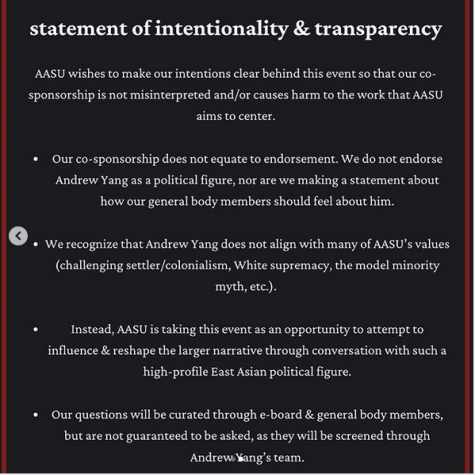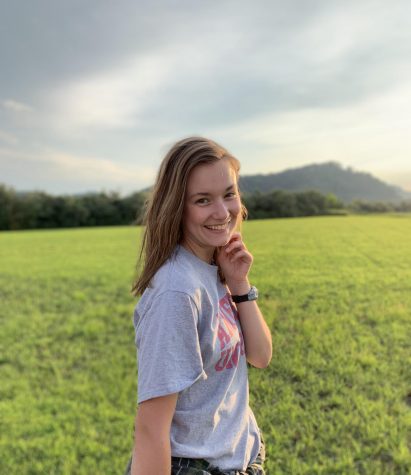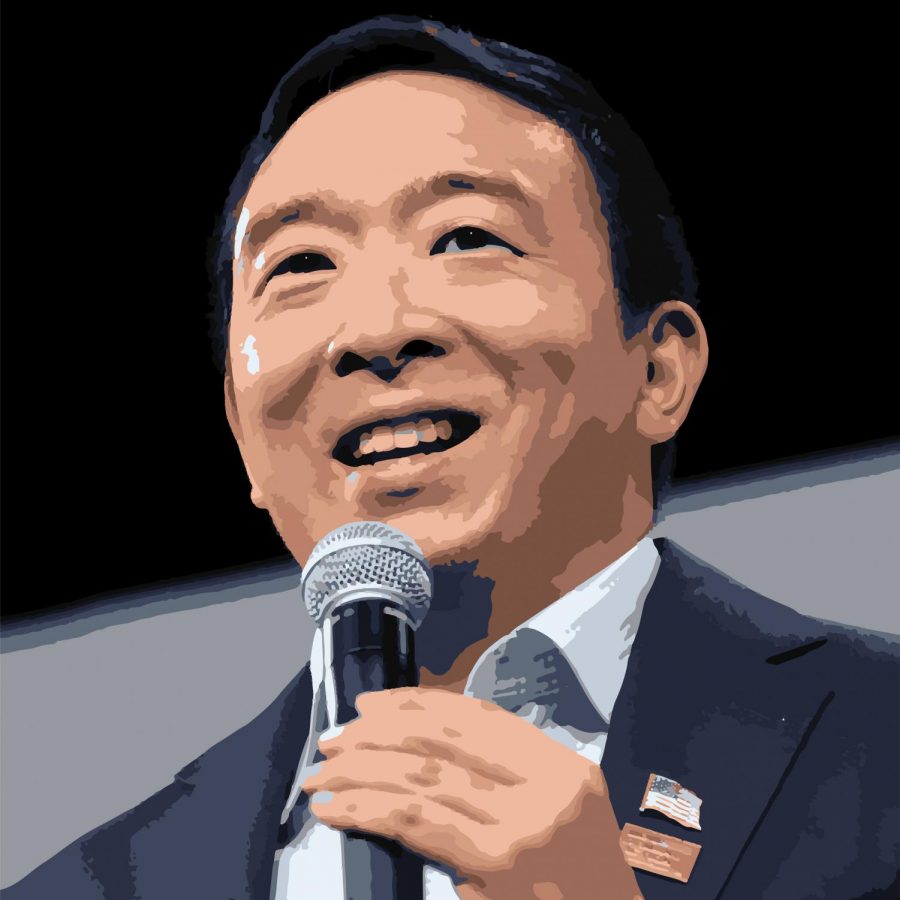Asian American Student Union leaders were “disappointed but not surprised” with Andrew Yang event
A white moderator, lack of control and a feeling that KPU was unfamiliar with their organization’s goals caused some members of AASU’s e-board to feel tokenized.
When students from the Asian American Student Union were asked by the Kennedy Political Union if they wanted to co-sponsor an event hosting Andrew Yang, former Democratic presidential candidate, their first thought was: why us?
Yang spoke to American University students about universal basic income, politics and identity during a Zoom event Oct. 29.
AU College Democrats and the Kogod School of Business joined the Kennedy Political Union and AASU as co-sponsors for the event. Caroline Bruckner, a tax professor and managing director of the Kogod Tax Policy Center, moderated the event, which highlighted his background as an entrepreneur and his role in the Democratic party today.
While AASU co-sponsored the event at KPU’s request, the organization’s leaders noted during several interviews with AWOL that Yang, while East Asian, does not represent the values and goals of their organization.
When Clarissa Cheung, digital media director and student advisor for the Advocacy Committee at AASU, first heard Andrew Yang was coming to AU and that KPU wanted AASU to cosponsor the event, she said her first thought was, “Oh no, absolutely not.”
“AASU has made a lot of strides in the direction that we are in now in what we value, which is being very open and active about challenging white supremacy, the model minority myth, racial triangulation and interrogating what Asian American and Pacific Islander means,” said Cheung. “Andrew Yang felt like a giant step backwards.”
After publishing an op-ed in the Washington Post where he encouraged Asian Amerians to “embrace their Americanness,” Yang received backlash from some claiming he was perpetuating the model minority myth.
The differences between Yang’s position on the Asian American identity and AASU were one reason why members felt hesitant to co-sponsor the event, but also because Yang has become a controversial figure in the Asian American community.
In an interview with student media before the event, Yang did not fully address concerns regarding his op-ed, past statements on Asian American identity and questions as to how he uses his influence as a high-profile member of the API community.
“[The op-ed] was urging really everyone to vote, to volunteer to take some kind of positive action in their community, and I don’t think people should have an issue with that message,” said Yang. “I’ve said in other contexts, probably hundreds of times, that Asian Americans are just as American as anyone else. Any suggestion that we’re not is completely wrong.”
But the event, and his responses to questions, caused concern for some AASU members before, during and after it was over.
Prior to the event, Cheung wrote a transparency statement that was posted along with AASU’s announcement of their decision to co-sponsor Yang’s appearance. The statement clarified that the sponsorship did not equate endorsement, and that AASU hoped to use the event as a chance to “influence and reshape the larger narrative” through conversation.

Cheung said other members of AASU were less opposed to the event, and the ultimate decision to co-sponsor the event was a compromise between different members’ opinions.
AASU co-President Emily Park told AWOL reporters she was surprised when KPU reached out to them to co-sponsor the event because Yang is so far from the organization’s values.
Stevie Marvin, AASU co-president, said that KPU reached out to the student organization Oct. 14 and AASU had to decide whether to co-sponsor the event by the following Wednesday. Park said the decision-making process was made more difficult by the fast-paced timeline set by KPU.
“If there was more time, there would be a better opportunity for us to discuss and for us to not have to make a really fast decision without necessarily all the answers that we were looking for,” said Park. “That plays into the feeling of being tokenized… we were not necessarily given equal say. It just feels very additive.”
Marvin and Park said KPU never fully explained to them the reasons behind including AASU in the event, which added to the feeling that they were an “afterthought.”
“If you’re thinking about Andrew Yang, the intersection of Andrew Yang is politics and Asians,” said Park. “So you grab a politics organization, like ‘okay we got it,’ and an affinity organization, ‘we got it.’ Like Stevie said, it can feel tokenizing, like we check a certain box.”
Jeremy Ward, executive director of AU Democrats, which also co-sponsored the event, said he received the email from KPU asking about the possibility of co-sponsorship Oct. 13, one day before AASU did.
Ward said the timeline felt “fine” to him, but said that was likely because of his previous experience in student government and his familiarity with how the organization functions.
AU Dems’ role as a co-sponsor felt fitting, Ward said, because it aligned with the organization’s goals of providing diverse ideological perspectives to their members.
While the decision to sponsor the event was a compromise between differing opinions, Park said the main reason AASU’s e-board decided to cosponsor the event was to ask Yang “tough” questions. She said the goal was to have more than one of their questions discussed.
“I think honestly it would feel worse if it’s one question and then they’re like, ‘Oh, he’s answered the race question,’” Park said in an interview prior to the event. “I would want to see some form of accountability and honesty and transparency.”
Two of the questions asked in the event related to topics AASU had sent in: Yang’s controversial op-ed and the heightened racism against Asians in the COVID-19 pandemic. Park said she was disappointed by Yang’s responses because there was “no admission of wrongdoing,” but she wasn’t surprised by the lack of a tough conversation.
“I just don’t think the event was organized in a way that was conducive to him being more honest or having more in depth conversations about him as a minority candidate,” she said. “We were barely a logo in that event.”

Amrutha Chatty, the director of KPU, said in an interview that AU Dems and AASU were reached out to specifically because of the tokenizing Park feared. But Chatty said the goal of doing this was not to “check a box,” but because both organizations represented an intersection of his political and racial identity.
“Every time we do an event, we try to reach out to the groups that identify most with the speakers,” Chatty said. “With Andrew Yang being one of the biggest, first Asian presidential candidates … he’s talked about his identity before, and even if it hasn’t always been in the best way, we wanted to make sure that AASU at least got the chance to interact with somebody and to give their input as much as they can on the event.”
Chatty also said part of the issue came down to logistics.
“We really regret that they feel tokenized, it was not our intention, and not at all how we try to work with our co-sponsors,” she said. “I think the difficulty we run into sometimes is that the structure of our events can be very rigid.”
Chatty said “if it were up to me, we would have given them as many questions as possible.”
She said that often, contracts with speakers aren’t solidified until weeks or days before KPU events, meaning that there is a tight schedule which forces all organizations involved to rush to get prepared. She also said KPU had limited control over the specific questions asked because Yang’s team ultimately made the decision on which questions would be addressed during the event.
“While we want to advocate for every organization, that’s something that’s been really important, to me, specifically, has been advocating for more students to get input on what happens in our organization,” said Chatty. “A lot of the times our hands are just tied.”
Marvin said some other members of AASU were also frustrated by the event’s disproportionate focus on Kogod, and many in leadership of the club felt let down.
Cheung said that while she had low expectations for the event, she “still managed to be disappointed” because she believed the moderator, Caroline Bruckner, “watered down” AASU’s questions.
“There has been discourse about why they had a white woman moderate the event, like if they’re going to tokenize AASU and be like ‘this is also an Asian American event’ but then have a white woman moderate it and talk a majority about taxes and the economy,” Cheung said. “Some people were like, “That’s why it was a Kogod event, it was just about taxes and the economy,” but I think that approach to it ignores the fact that he can’t choose to not be racialized inherently because of how the U.S. nation state works … and that’s why you reached out to the Asian American Student Union, so their choice of moderator added to how we felt tokenized.”
Bruckner said in an interview that her objective for the event was to discuss Yang’s experience as a business leader and as a policy advocate. She asked all 15 questions given to her by KPU, which Yang had access to beforehand.
Bruckner said over email that she asked the questions she had been given from the student groups “almost verbatim,” as well as the questions she developed that had been approved by the event organizers and Yang’s team.
In response to whether she was the right choice as a white person, Bruckner said over email that she agrees with prioritizing representation of people of color but that the organizers wanted a Kogod professor with her specific experience related to Yang’s background.
“I am an expert on small business and entrepreneurship, with a focus on women business owners and the need for inclusive data in policymaking, which fits with Mr. Yang’s experience and policy platform,” Bruckner said over email.
Bruckner said that KPU’s objectives for the event were to discuss the different aspects of Yang’s background and let him talk about his experiences, and it was important to her that she focus primarily on those.
“The event was about hearing his perspective and what he brings to the table, and by that measure the event was successful,” Bruckner said.
Chatty said she believed Bruckner was a good choice for a moderator, and that although she was not an expert in API identity, she was well versed on Yang’s background in tax policy.
“She wasn’t well equipped to answer these specific questions, but she was better equipped to answer other questions,” Chatty said. “She might not have had the expertise to navigate that specific space [of identity], the rest of the conversation was not just about those specific questions, but rather about broader questions about things that she was an expert in.”
KPU sent a post-event feedback form to AASU, and Park and Marvin said they addressed how the event made them and some of their members feel tokenized. They also suggested changes for the future, such as letting them help choose the moderator and giving them more notice before the event.
Marvin said that if KPU had been familiar with AASU’s work, they would have known how different AASU’s values are in comparison to Yang’s. She said AASU had also expressed their conflicting views on the event to KPU, but weren’t given more of a voice.
“They could have found other ways of access for our organization instead of just telling us what to do,” Marvin said.
Chatty said KPU is taking steps to ensure other organizations don’t leave co-sponsored events feeling the way members of AASU did. She said KPU will work in the future to ensure student organizations are involved earlier in the process of selecting speakers and planning events, and listen to their feedback on potential moderators.
“As to the feeling of tokenization, we can’t judge whether or not we’ve solved that until we work with an organization again that feels that we’ve done a good job and feels that we’ve partnered with them well,” said Chatty. “All we can do is kind of take some of the feedback they’ve given us and do what we can to, maybe, course correct on things that it’s possible to.”
Chatty said KPU would make changes going forward to address concerns raised by members of AASU so that other organizations wouldn’t have similar experiences.
“It’s really important that we’re not just operating in a bubble, we want to make sure that when we’re doing things, we’re representing students and what they want to see,” Chatty said. “This partnership may not have been the perfect thing for AASU … but we’re glad that they took the time to give us meaningful feedback, because we’re taking that really seriously.”
In an interview prior to the event, Marvin said she wanted to make it clear that she and Park were “not trying to smear KPU” and believe the organization’s leaders have good intentions. She said AASU leadership would be open to doing more events with KPU in the future, but they would need to have more agency.
After the event, Park said the issues she had seen were indicative of a larger problem with AUSG and the larger AU community not prioritizing students of color and not being dedicated to fighting racism.
“If you really want to prioritize us and do real work on campus, you would make us feel like we have a space and not like a 15 minute sidepiece,” Park said. “I think American in general is like, ‘We love diversity and students of color,’ but you treat us as your 15 minute appetizer.”

Grace Vitaglione (she/her/hers) is a junior from West Virginia studying journalism at American University, with minors in Creative Writing and Spanish....







